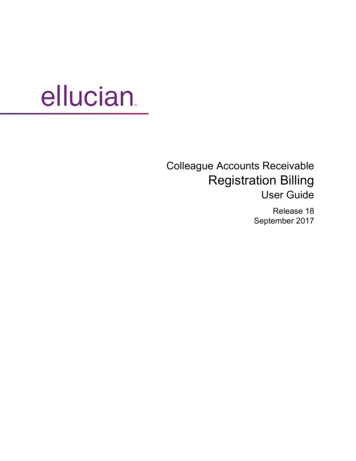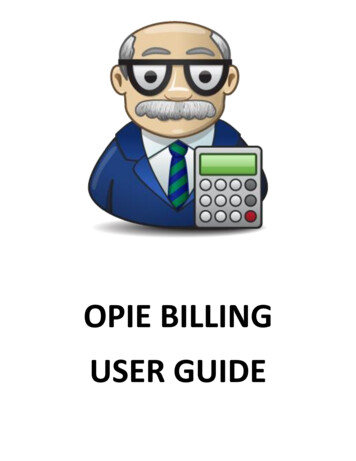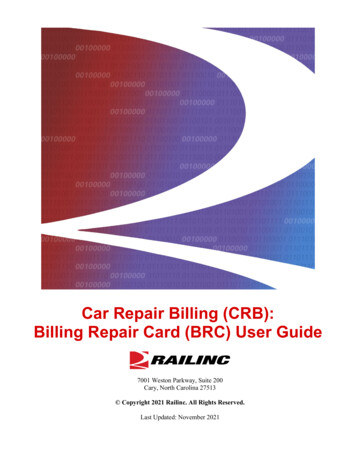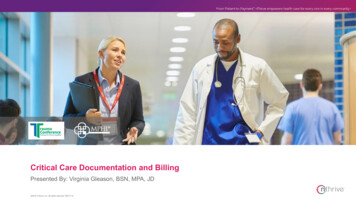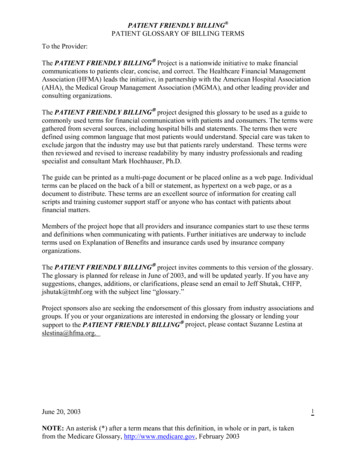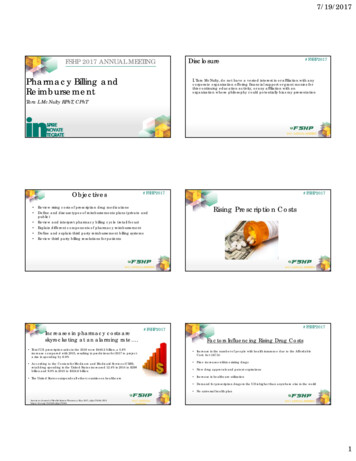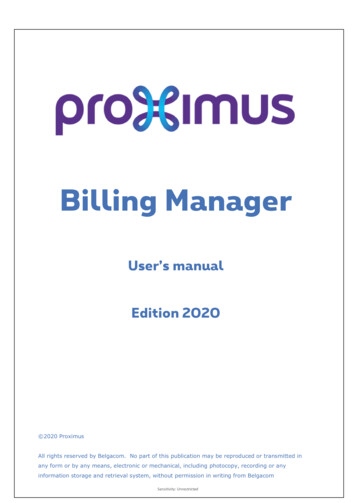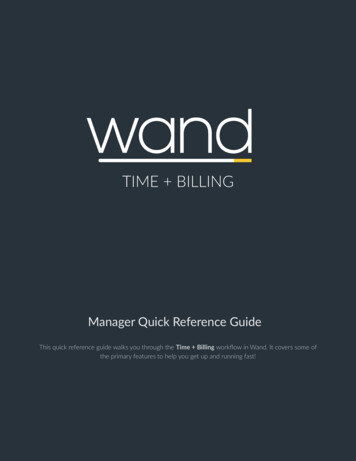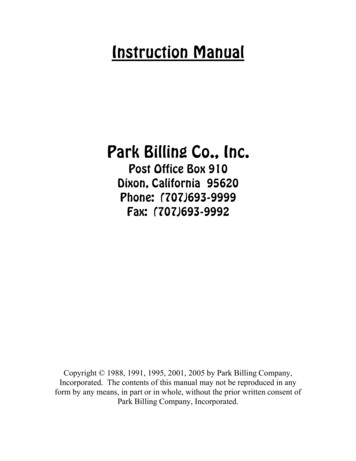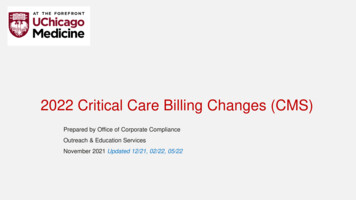
Transcription
2022 Critical Care Billing Changes (CMS)Prepared by Office of Corporate ComplianceOutreach & Education ServicesNovember 2021 Updated 12/21, 02/22, 05/22
Critical Care Services (non-Infant/Neonate)This is an overview of the 2022 changes to Critical Care Service billing (99291-99292)DISCLAIMERS: Information in this material has been provided to the best of our knowledge at the time of publication, andmay be subject to revision pending further guidance or clarification by CMS and our local contractor NGSMedicare Some of the guidance in this material is specific to/intended for UCM practitioner workflowsUsage of Content:If using any content verbatim from this document, we kindly ask that you include a credit to this material. Thank you!compliance@bsd.uchicago.edu
Critical Care Services (non-Infant/Neonate)99291 Critical care, evaluation and management of the critically ill or critically injured patient; first 30-74 minutes99292 Critical care, evaluation and management of the critically ill or critically injured patient; each additional 30 minutes2022 CMS Changes:1. Physicians or NPPs in the same specialty may bill concurrent critical care services2. Split sharing of critical care services will be allowed with the use of New Modifier FS3. CMS will pay for an ED visit or Other E/M service on the same day as Critical Care with use of Modifier 254. Critical Care Visits will be Separately Billable from Global Surgery when unrelated with the use of New Modifier FT5. Critical Care Medical Record Documentation RequirementsUnchanged: CMS is officially adopting the CPT definition of critical care and bundling rules, which is unchanged for 2022 (seeaddendum)
Critical Care ServicesChange 1: Physicians or NPPs in the same specialty may bill concurrent critical care servicesConcurrent Care more than one practitioner rendering similar services (i.e. hospital visits) during a period of time, payable if:1.2.3.The patient’s condition warrants the services of more than one physician on an attending (rather than consultative) basisThe individual services provided by each practitioner are reasonable and necessaryThe services are non-duplicative Different specialties: concurrent care not seen as unusual as each specialty managing a distinct condition (usually with a different diagnosis) Same specialties: expected to occur infrequently and not be as reasonable since both practitioners would have the skills and knowledge totreat the patient (CMS updating stance relative to Critical Care 2022)Historical Reimbursement Policy Different specialty practitioners may each bereimbursed for their critical care services on thesame DOS:Different SpecialtyCardiologist: 99291 & 99292Surgeon: 99291 & 99292 Prior to 2022: Same specialty practitioners billing criticalcare must bill and be paid as “one” when multiplepractitioners provide services on the same DOS.Same Specialty (Historical i.e. 2021)Internist A: 99291 & 99292Internist B: N/A, no additional billing4
Critical Care Services99291 Critical care, evaluation and management of the critically ill or critically injured patient; first 30-74 minutes99292 Critical care, evaluation and management of the critically ill or critically injured patient; each additional 30 minutesChange 1: Physicians or NPPs in the same specialty may bill concurrent critical care services2022 Reimbursement PolicyIn 2022, CMS is recognizing that critical care services may be provided concurrently by more than one practitioner in the samespecialty if:1. The Critical Care visit is medically necessary & 2. Each visit meets the definition of critical careSame Specialty Critical Care 2022A. Subsequent Care (i.e. 99292): CMS will allow each individual in the same specialty to report concurrent follow-up care for subsequentcritical care time intervals. Each clinician will submit a charge under their NPI.2022 Subsequent CareInternist A initial critical care 75 min 99291 x 1 “Internist A” CPT 99291 is still only reported by one provider in same specialty per DOSInternist B subsequent critical care later in the day 90 additional minutes 99292 x 3 “Internist B”B. Aggregate Time (adding times of 1 practitioner): CMS will allow the time of multiple practitioners in the same specialty to beadded to meet 99291 or 99292. When aggregating time of two practitioners, the total time will be represented by one charge line item.Aggregate Time: 99291 (min 30 minutes)Pulmonologist A 20 mins of critical care unbillable, did not reach minimum timePulmonologist B 30 mins of critical care 50 mins, minimum time now met “1 charge is billed with 99291 for aggregate time”Aggregate Time: 99292 (min 104 minutes)If “aggregate time” was used to reach 99291, an additional 30 minutes beyond the first 74 minutes must be reached to bill 992925 at least 104 total minutes to report 99292 (i.e. 74 mins 99291 30 addt’l mins for 99292) “1 charge is billed with total time”
Critical Care ServicesChange 2 : Critical Care Services May be Split Shared with New Modifier FSCurrent State Critical Care may not be Split Shared. Beginning in 2022, it may be Split Shared.Who Bills the Split Shared Critical Care Visit?The practitioner who provided the substantive portion of the visit may bill. Substantive Portion more than half the cumulative total time of both providersExample: APN Lee 20 mins Critical Care Dr. Jones 45 mins Critical Care Total Time 65 minutesDr. Jones may bill for the visit since more than half of the 65 total minutes was spentNOTE: Count any overlapping or joint practitioner time only once i.e. an APN & Physician each separately spend 20 minutes, plus10 mins of joint time discussing the patient 40 10 (50 mins)Documentation Requirements: Each practitioner documents a note for the medically necessary critical care they personally performed Each practitioner documents the time they spent in the medical record Document the visit was done in conjunction with the other practitioner Billing practitioner uses .SPLITSHARED CRITICALCARE or other critical care smartphraseSplit Shared Service Modifier Required: Beginning January 1st, CMS will require a new modifier FS to be appended to Split Shared critical care6
Critical Care ServicesChange 3: Critical Care Other Visits are Payable on the Same Day with Modifier 25Current CMS Rule2022 Change1. EM services are NOT payable on the samedate as critical care by the same provider1. Practitioners may bill for E/M services provided on the sameday when there is supporting documentation.2. Hospital inpatient or outpatient servicesare only payable on the same date ascritical care if provided at a time thepatient did not require critical careNew Documentation Requirements:The practitioner must document that:1. the E/M service was provided prior to the time whenpatient did not require critical care2. the service is medically necessaryNo modifier required3. the service is separate and distinct with no duplicativeelements from the critical care service later provided use dotphrase .CRITICALCARE SAME DAY EM NEWModifier 25 must also be appended to the Initial E/M service bill7for this scenario
Critical Care ServicesChange 4: Critical Care Visits Separately Billable from Global Surgery with a New Modifier FTNote: Providing medical care to a critically ill, injured, or post-operative patient qualifies as a critical care service only ifboth the illness/injury and the treatment being provided meet critical care requirements.Current Critical Care Global RulesPre-operative and Post-operative Critical careis included in the surgical package of manyprocedures with a 10 or 90 day global period2022Concept is essentially unchanged, but CMS is requesting a newmodifier FT be used to report critical care unrelated to theprocedure. There are also specific criteria that must be met. Critical Care visits may be separately paidin addition to a procedure with a globalsurgical period as long as the critical careservice was unrelated to the procedure.Requirements to bill Critical Care separate from global package: Service provided meets the definition of critical care andrequires the full attention of the physician/QHP Critical care is above and beyond the procedure performed Critical care is unrelated to the specific anatomic injury orgeneral surgical procedure performed use dotphrase .CRITICALCARE UNRELATED PROCNote: If care is fully transferred from the surgeon to an intensivist, then Modifiers 54 (surgical care8only) & 55 (postoperative management only) must also be reported when applicable
Critical Care Services Documentation RequirementsChange 5: Critical Care Medical Record Documentation RequirementsMedical Record Documentation Requirements1. Document Total Time: each reporting practitioner must document the total critical care time they provided2. Services furnished to each patient & medical necessity: documentation should indicate that the services furnished tothe patient, including any concurrent care, were medically reasonable and necessary (for the diagnosis or treatment of illness or injury or toimprove the functioning of a malformed body member).3. Role of Each Practitioner in Concurrent Care: services should clearly identify the role each practitioner played in thepatient’s care:a) the condition(s) for which each concurrent care practitioner treated the patientb) document if critical care was subsequent to initial critical care by colleague (please note practitioner)c) document if you are billing based on aggregate time (identify whose time you are adding on to) Split Shared Critical Care Please see Split Shared services training for more information on Split Shared billing requirements.The documentation requirements for all split shared E/M visits would also apply to critical care visits, such as:1. services should indicate both practitioners who provided care2. the record must be signed and dated by the billing provider3. Total time of each practitioner should be documented9
Critical Care Services Wrap-Up1. Subsequent Critical Care Services may be billed by providers in the same specialty, including the aggregation of time tomeet Initial or Subsequent Critical Care2. Critical Care Services may be split shared, along with a new modifier FS which needs to be added. Please see Split Shared servicestraining for more information on Split Shared billing.3. Critical Care may be billed on the same day another E/M service if it occurred prior to the patient needing critical careand Modifier 25 is added4. Critical Care may be unbundled from the Global Surgery package when it is unrelated to the anatomic region or generalsurgical procedure performed, and a new modifier FT is addedModifiers Required 2022: Critical Care services on the same day as an ED or Other E/M Service will now require Modifier 25 Critical Care services unrelated to the global surgery will require new Modifier FT Critical Care services which are split shared will require new Modifier FSFor questions in the meanwhile, reach out to: Compliance compliance@bsd.uchicago.edu10
Addendum11
References CMS Medicare Claims Processing Manual (Pub.100-04), Chapter 12 nce/Manuals/Downloads/clm104c12.pdf). CMS FY22 Physician Fee Schedule Final Rule: -23972.pdf Internet-Only Manual Updates (IOM) for Critical Care https://www.cms.gov/files/document/r11288cp.pdf CMS Internet-Only Manual Updates for Critical Care MM12550 management-services.pdf NGS Critical Care FAQs: Evaluation and Management - NGSMEDICARE NGS Critical Care Policy Clarification 3-29-22 AMA CPT Section Manual Guidance for 99291-99292
Critical Care CPT Guidelines OverviewKey RulesFull attention requiredFor any given period of time spent providing critical care services, the individual must devote his orher full attention to the patient and, therefore, cannot provide services to any other patient during thesame period of time.Reportable TimeNon-Reportable Time1. Time spent engaged in work directly related to theindividual patient's care whether that time was spent at theimmediate bedside or elsewhere on the floor or unit,2. Plus includes:a) time on the floor or nurses station reviewing testresults or imaging,b) discussing critically ill patient’s care with other medicalstaffc) When patient is unable or lacks capacity to participatein discussions, time spent on the floor or unit withfamily members or surrogate decision makersobtaining a history, reviewing patient’s condition orprognosis, or discussing treatment or limitations oftreatmentThe following may not be reported as critical care1. Time spent on separately reportable activities2. Time spent in activities that occur outside ofthe unit or off the floor (e.g. telephone callswhether taken at home, in office, or athospital) since individual is not immediatelyavailable3. Time spent in activities that do not directlycontribute to the treatment of the patient,even if performed in the critical care unit (e.g.participating in administrative meetings ortelephone calls to discuss other patients)13
Critical Care CPT Guidelines OverviewKey CPT Guidance/Definitions Critical care is the direct delivery by a physician(s) or other qualified health care professional of medical care for a critically illor critically injured patient. A critical illness or injury acutely impairs one or more vital organ systems such that there is a high probability ofimminent or life threatening deterioration in the patient's condition. Critical care involves high complexity decision making to assess, manipulate, and support vital system function(s) to treatsingle or multiple vital organ system failure and/or to prevent further life threatening deterioration of the patient'scondition. Examples of vital organ system failure include, but are not limited to: central nervous system failure, circulatoryfailure, shock, renal, hepatic, metabolic, and/or respiratory failure. Although critical care typically requires interpretation of multiple physiologic parameters and/or application of advancedtechnology(s), critical care may be provided in life threatening situations when these elements are not present. Critical care may be provided on multiple days, even if no changes are made in the treatment rendered to the patient, providedthat the patient's condition continues to require the level of attention described above. Providing medical care to a critically ill, injured, or post-operative patient qualifies as a critical care service only if both theillness or injury and the treatment being provided meet the above requirements. Critical care is usually, but not always, given in a critical care area, such as the coronary care unit, intensive care unit, pediatricintensive care unit, respiratory care unit, or the emergency care facility14
Critical Care CPT Guidelines OverviewBundled ServicesFor professional billing the following services are included in Critical Care and not separately billable: the interpretation of cardiac output measurements (93561, 93562),chest X rays (71045, 71046),pulse oximetry (94760, 94761, 94762),blood gases,collection and interpretation of physiologic data (eg, ECGs, blood pressures, hematologic data);gastric intubation (43752, 43753);temporary transcutaneous pacing (92953);ventilatory management (94002-94004, 94660, 94662);and vascular access procedures (36000, 36410, 36415, 36591, 36600).Any services performed that are not included in this listing should be reported separately.Facilities may report the above services separately.15
Critical Care CPT Guidelines OverviewReporting TimeCritical care of less than 30 minutes total duration on a given date should be reported with the appropriate E/Mcode.1. Code 99291 is used to report the first 30-74 minutes of critical care on a given date. only use once per date even if the time spent by the individual is not continuous on that date.2. Code 99292 is used to report additional block(s) of time, of up to 30 minutes each beyond the first 74minutes. (See the following table.)The following examples illustrate the correct reporting of critical care services: less than 30 minutes30-74 minutes (30 minutes - 1 hr. 14 min.)75-104 minutes (1 hr. 15 min. - 1 hr. 44 min.)105-134 minutes (1 hr. 45 min. - 2 hr. 14 min.)135-164 minutes (2 hr. 15 min. - 2 hr. 44 min.)165-194 minutes (2 hr. 45 min. - 3 hr. 14 min.)195 minutes or longer (3 hr. 15 min. - etc.)Appropriate E/M Codes99291 X 199291 X 1 AND 99292 X 199291 X 1 AND 99292 X 299291 X 1 AND 99292 X 399291 X 1 AND 99292 X 499291 and 99292 as appropriate16
Contacts/Resources17
Reporting MechanismsIt is your responsibility to promptly report any compliance concerns,and suspected or actual violations that you may be aware of.Contact the Office of Corporate Compliance directly at (773)834-4588 or PHA: 773-834-2995 or you may email us at:compliance@bsd.uchicago.edu or PHA: lwarren@bsd.uchicago.eduReport directly to your immediate supervisor, departmentalmanager, the Department of Human Resources, or Legal Affairsat (773) 702-1057/ 24 Hour Pager #: 7602Call the Compliance Resource Line at (877) 440-5480, orinternally at (773) 834-3222Applicable Policy: Compliance 10-01 “Reports of Compliance Concerns and Violations”18
Compliance Resource Line(877) 440-5480 or PHA: (833) 484-0055PURPOSEThe Compliance Resource Line may be used to obtain answers to questions relating to compliance and to reportsuspected or potential misconduct, violations of the Medical Center’s compliance policies, or violations of the law.Toll Free # with voicemail andno caller idAll calls investigatedCallers are covered by nonretribution, non-retaliationpoliciesCallers who wish to remain anonymous are informed that in some circumstances, their concerns cannotbe adequately addressed unless certain information is revealed that may also reveal the caller’s identity.19
OCC Resources (Website) OCC Policies and Guidances20
Resources OCC Website: http://compliance.bsd.uchicago.edu/ Compliance Resource Line .(877) 440-5480, or at (773) 834-3222PHA: (833) 484-0055, or at (708) 915-5678 Krista Curell 2-9785 Executive Vice President Tracy Volel 4-4733 Chief Compliance Officer Leslie Warren 4-2995 .Associate Compliance Officer Tomicia James-Miller 4-1143 .Director, Audit Services Tasha Osafo 4-3047 .Director, Compliance Education, Risk and Data Services Mia London 4-3858 .Program Manager, Education and Outreach21
Critical Care Services (non-Infant/Neonate) 99291 Critical care, evaluation and management of the critically ill or critically injured patient; first 30-74 minutes 99292 Critical care, evaluation and management of the critically ill or critically injured patient; each additional 30 minutes Unchanged: CMS is officially adopting the CPT definition of critical care and bundling rules, which .
